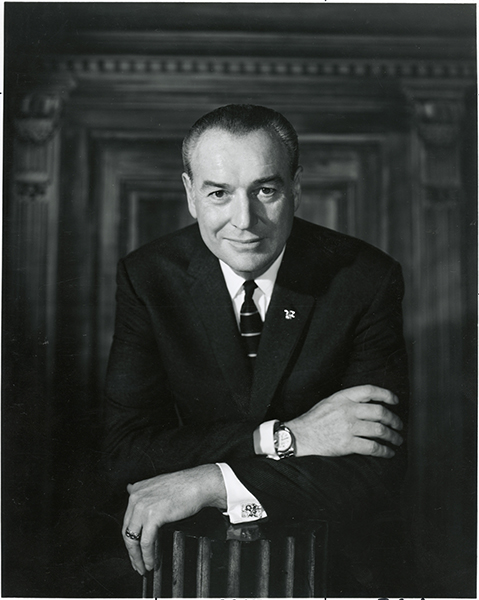Gov. Winthrop Rockefeller, nine others inducted into Arkansas Civil Rights Heritage Trail
The University of Arkansas at Little Rock Anderson Institute on Race and Ethnicity honored the legacy of Gov. Winthrop Rockefeller and nine other individuals at the 2018 induction of the Arkansas Civil Rights Heritage Trail honorees.
Established in the summer of 2011, the Arkansas Civil Rights Heritage Trail honors those who made significant contributions to civil rights in Arkansas. The trail raises public awareness of the long and rich legacy of Arkansas’s civil rights history. This year’s theme is “Gov. Winthrop Rockefeller.”
The Anderson Institute inducted the new honorees Wednesday, April 4, on the steps of the state Capitol. The ceremony was held in partnership with the commemoration of the 50th anniversary of the Rev. Martin Luther King Jr.’s assassination.
John Kirk, director of the Anderson Institute and George W. Donaghey Distinguished Professor of History at UA Little Rock, is writing the first full-length biography on Rockefeller. His book will be the first to extensively explore the Rockefeller papers housed at the UA Little Rock Center for Arkansas History and Culture.
Rockefeller was inaugurated as governor of Arkansas in 1967, becoming the first Republican governor of the state since Reconstruction. Rockefeller’s election victory depended heavily on black votes against his segregationist opponent James D. Johnson. Rockefeller’s family background and upbringing nurtured a lifelong commitment to pursuing fairer treatment of African Americans.
While in office, Rockefeller appointed a number of African Americans to state commissions and departments for the first time. In 1968, Rockefeller was the only governor in the Southern states to hold a memorial service in remembrance of the Rev. Martin Luther King Jr. after his assassination on April 4, 1968.
Rockefeller ran for a third term as governor in 1970 but was defeated by Democrat Dale Bumpers. Rockefeller died in 1973. His legacy lives on today through the work of the Winthrop Rockefeller Foundation, the Winthrop Rockefeller Institute, and Winrock International.
A 12-inch bronze marker will be placed on the trail for each honoree. The trail begins in front of the Old State House Convention Center on Markham Street and will eventually extend to the William J. Clinton Presidential Center and Park and other points throughout the downtown corridor.
For more details, please contact the Anderson Institute at 569-8932 or race-ethnicity@ualr.edu.
The honorees include:
Elijah Coleman was appointed to the Arkansas State University Board of Trustees by Rockefeller in September 1970 and was the first African American to serve on the board. Coleman became principal of Townsend Park High School in Pine Bluff and was later elected president of the Arkansas Teachers Association.
William Louis “Buck” Currie Jr. was appointed to the Arkansas Penitentiary Board by Rockefeller in January 1968 and was the first African American to serve on the board. His vision was to establish a vocational education program within state prisons to offer the inmates an opportunity to become productive members of society upon release.
Reverend M. L. Hendricks was the first African American appointed to the Arkansas State Police Commission by Rockefeller in February 1968. The appointment followed criticism over the scarcity of African-American state troopers in Arkansas. At the time of his nomination,. Hendricks was the presiding elder of the Little Rock District CME Church, and he had been active in the Urban League of Greater Little Rock and in the NAACP.
Dr. Sybil Jordan Hampton was the first African-American student to attend every grade at Little Rock Central High School after its desegregation. After teaching at many universities throughout the United States, Hampton returned to Arkansas in 1996 to become the executive director of the Winthrop Rockefeller Foundation, a position that she held until her retirement in 2006. In 2014, Arkansas Attorney General Dustin McDaniel appointed Hampton to the state Ethics Commission.
James “Jimmy” Hudson, who began working for Rockefeller in 1937, served as general superintendent of his Winrock Farms project on Petit Jean Mountain, contravening the segregated racial hierarchy that existed in the state. When Rockefeller founded the Rockwin Fund (today the Winthrop Rockefeller Foundation) in 1956, he named Hudson as one of its founding trustees, ensuring that the fund would be integrated from the very outset. In 1960, Hudson left Arkansas to accept a position with Nelson A. Rockefeller’s New York State Labor Commission.
Annie R. Zachary Pike was appointed to the Arkansas Board of Public Welfare by Rockefeller in April 1967, a position that she held until 1985. At the time of her nomination, Pike was the president of the Marvell District 22 Parent-Teachers Association.
Minnie Pearl Ross was appointed as junior auditor to the State Income Tax Division of the Arkansas Revenue Department by Rockefeller in September 1967. In the following year, she became the first African-American woman to serve on the Republican State Committee.
The Reverend Doctor Emery Washington was appointed to the Arkansas Board of Education by Rockefeller in March 1969. At the time of his nomination, Washington was director of the Christ Church Episcopal kindergarten and nursery in Forrest City. He was also chairman of world relief for the Episcopal Diocese and a board member of the Diocese Executive Council. Washington stated that his main concern as an educator was for every child to receive a quality education.
Austine White Williams was the first African American appointed to the Arkansas Board of Cosmetology by Rockefeller in January 1967. Williams had served as an inspector for the board between 1950 and 1956 and was an instructor in cosmetology at the Arkansas School for the Deaf at the time of her nomination.
